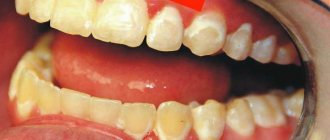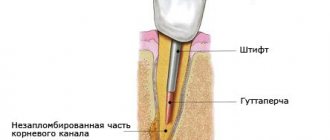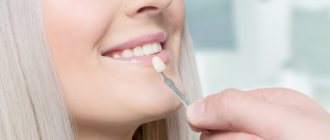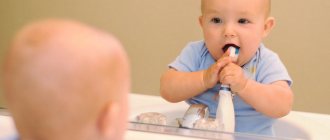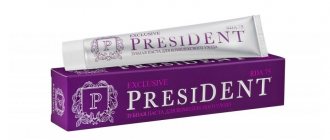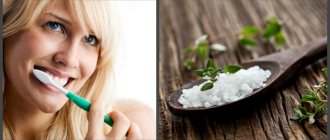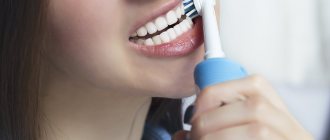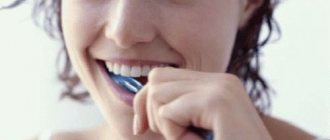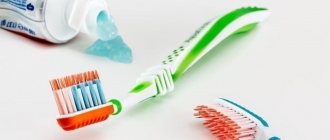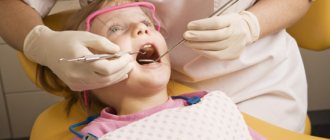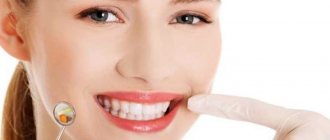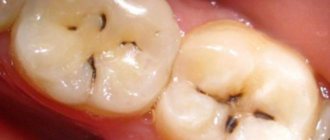Every day, when we wake up in the morning, the first thing we do is wash our face and, of course, brush our teeth, because since childhood we remember my mother’s words that if we don’t clean them, they will fall out. So was mom right or is this just a well-invented “fairy tale” for children?
The commercials also insist that teeth should be brushed after every meal, and the dentists look very convincing in them. We need to figure out whether this is true or not. And we will start with the simplest thing - how many times a day, when, for how long, what and how should you brush your teeth?
When should you brush your teeth?
I think that everything is clear with evening brushing - before going to bed, the oral cavity must be cleaned, because all the particles of food that remain on the teeth have time to rot overnight, and this leads to the proliferation of bacteria, and in the future to caries and other dental diseases.
But what is the right thing to do in the morning? Should you brush your teeth before or after eating? Here the opinions of dentists differ radically. After all, bacteria that appear overnight, and this happens in any case, without morning cleaning, enter the body along with food, but it is also impossible not to disinfect the mouth after eating. So what should we do? We will give you the answer - you need to brush your teeth before breakfast, and after it just rinse with a special product.
Why every person needs to have their teeth and gums cleaned
The oral cavity is a kind of gateway for various pathogenic microorganisms to enter the human body. Remains of food, stuck in the teeth, begin to rot and decompose. As a result, bacteria accumulate in the interdental spaces, leading to the development of various dental diseases. If there is a constant focus of infection in the mouth, it can spread to the internal organs and provoke even more serious pathologies.
Only with a properly selected brush can you thoroughly clean food crumbs from the interdental spaces and massage your gums. Toothpaste, purchased taking into account age restrictions, will balance the microflora in the oral cavity, disinfect it and provide long-lasting fresh breath. It is impossible to destroy pathogenic microflora in the mouth in any other way.
What is the best way to brush your teeth?
Let's talk about choosing a toothbrush. First of all, you need to consult with your dentist; he will tell you what is right for you. It is also worth considering that a brush that is too soft does not remove plaque well, while a brush that is too hard can damage the enamel and injure the gums. It all depends on your type of teeth. It has also been proven that the cost of the brush has absolutely no effect on its cleaning quality.
Therapeutic and prophylactic pastes
These pastes contain substances that have an antibacterial effect. Their effect is to reduce inflammation and prevent the development of caries. Such pastes should be purchased on the recommendation of a specialist in pharmacies.
Such pastes are divided into:
- Contains extracts of medicinal herbs and essential oils that help relieve inflammation and accelerate tissue regeneration processes. The essential oils in the composition help eliminate bad breath.
- Containing minerals and salts, which helps strengthen tooth enamel, accelerate tissue healing and reduce plaque formation.
Which toothpaste is best for brushing your teeth?
And again, it all depends specifically on your type of teeth, because there is no single universal toothpaste.
If your teeth are too sensitive, then you need a paste that reduces pain from external irritants. If your gums are bleeding, then you need a paste that cares specifically for this part of the oral cavity. There are also pastes that prevent the appearance of caries and tartar. The main thing is not to be fooled by loud advertising slogans and choose a paste after carefully reading its composition.
It is worth talking separately about whitening pastes. Yes, they really clean plaque more intensively than others. But! They are also contraindicated for those who have problems with tooth sensitivity, wedge-shaped defects and many diseases of the oral cavity. In addition, such toothpastes will not whiten teeth beyond their natural color.
The nuances of choosing a toothbrush and toothpaste
Today there is a wide range of different models of toothbrushes. When choosing, you need to consider three main parameters:
- Rigidity.
- Form.
- Size.
For sensitive teeth, the best option would be a brush with soft bristles that do not harm the enamel and gums. For less sensitive enamel, you can use a brush with medium-hard bristles. Such brushes provide maximum cleaning of teeth from plaque, but at the same time, they injure the enamel the most.
The shape of the toothbrush should be selected based on personal preference. It is best to purchase a brush yourself, following the recommendations of your treating specialist. When choosing a size, it is better to assume that the head is small. Such a toothbrush will allow you to reach all, even the most inaccessible places in the oral cavity, which will help ensure the most thorough dental hygiene. It is recommended to replace the brush with a new one once every 3 months or even more often, depending on wear. You should also replace the brush after getting rid of dental diseases, since pathogenic microflora may remain on the bristles. It is also important to approach the choice of pasta individually. Currently, there are a huge number of all kinds of pastes that solve various problems - the prevention of dental diseases, for example, caries or tartar, increased sensitivity of teeth or bleeding gums. To select the necessary paste, as well as brushes, it is better to contact a specialist. He will help you choose hygiene products individually for each oral cavity.
How to brush your teeth with tooth powder?
Nowadays, tooth powder is already a thing of the past and even sounds somewhat unusual, but in fact this product is very useful for use, it can not only whiten teeth, but also strengthens gums and enamel! And using it is quite simple, you need to dilute a small amount of powder with water until a paste forms and apply it to a brush and brush your teeth using the technique already indicated in this article.
The following questions always remain relevant: is it possible to brush your teeth after tooth extraction, how to clean while wearing braces, and how to properly brush children’s teeth. And we have answers to them.
Brushing your teeth: important tips
Dentists give recommendations not only on how long you should brush your teeth, but also on how exactly you should brush them:
- Before starting the procedure, you need to rinse your toothbrush thoroughly;
- It is recommended to squeeze out about 1 cm of paste onto the brush;
- The lower jaw is cleaned first, the upper jaw second;
- The angle of inclination of the brush when cleaning should be no more than 45 degrees;
- the chewing surface of the molars must be cleaned with circular, rotational and translational movements;
- special attention should be paid to cleaning the tongue: it can be cleaned with the back of a regular brush or with a special tongue brush;
- Upon completion of the hygiene procedure, you need to thoroughly massage the gums with stroking and kneading movements.
After each meal, you should rinse your mouth to clean the surface of your teeth and the spaces between your teeth. Most often, plain water is used for rinsing, but you can also use herbal infusions or professional mouth balms. In addition, it is recommended to use dental floss regularly.
During the day, it is not necessary to resort to brushing with a paste, since there is no need to brush your teeth too often - this is harmful to the enamel. It is enough to rinse your mouth with plain water or a specialized product.
How to brush children's teeth
Early formation of caries on baby teeth can lead to the formation of carious cavities on permanent teeth. If your baby's baby teeth have to be removed, he may develop a malocclusion or speech impediment in the future. You should brush your baby teeth as many times a day as your molars. There shouldn't be any difference.
The procedure should take 2 minutes. If your child has difficulty keeping track of time, you can buy an hourglass or set a timer on your mobile phone. In this case, brushing your teeth will turn into an exciting activity.
Implant cleaning
Patients with implants should contact a dental clinic and ask how long they should brush their teeth and what product is best to use for proper oral care. Following all the dentist’s recommendations will extend the life of the dentures and avoid the development of many dental diseases.
Both children and adults should brush their teeth twice a day, each session lasting 2-3 minutes. If for some reason a person does not have the opportunity to use a brush and toothpaste, it is worth at least rinsing his mouth with plain water.
Category Hygiene Published by Mister stomatolog
How to properly brush teeth with braces?
Many of us are forced to wear braces; the process itself may not be very pleasant, but after that we can enjoy a beautiful smile and correct bite. But how to clean while wearing braces? This process will, of course, take more time, but you just need to get used to it. You can purchase a special brush or use a regular one, the movements of which should occur either in a circle or up and down and nothing else; you also need special threads and rinses. Be sure that by following all these points, your oral cavity will be disinfected and free of germs.
Additional oral care products
Such hygiene products enhance the effect of brushing your teeth and help maintain oral hygiene in between brushings. 1. Dental floss or floss. Using dental floss helps remove food debris from between the teeth, which is not always possible even with a toothbrush. There is a wide range of flosses on sale. Their use does not take much time. 2. Mouth rinses. Such liquids are convenient to use to freshen breath, although they also have other purposes. Mouthwashes contain bactericidal substances that fight bacteria that cause various diseases in the oral cavity. You should pay special attention when choosing a mouthwash for your child, since most of them contain alcohol. Alcohol-containing mouthwashes should not be used in children. It is necessary to use mouthwash after brushing your teeth or eating food. The rinse duration should be approximately 30 seconds.
There are a large number of hygiene products that help you perform the necessary oral care. They should be used correctly to reduce the number of trips to the dental office.
How to properly brush children's teeth?
You need to start caring for your child’s teeth even before they appear, by cleaning the baby’s mouth with a special silicone brush, which can be purchased at any pharmacy. This procedure will help prevent the appearance of caries on your baby’s future baby teeth. And the child needs to continue brushing his teeth until he is 6-7 years old, until he himself understands the importance of this procedure and learns to perform it on his own.
And know that the main thing in maintaining dental health is to remember that oral hygiene completely depends only on us and on how responsibly we approach such a procedure. If you follow the basic rules described in this article, you can avoid many oral diseases in the future!
Help: You can make an appointment with a dentist here.
In adults
Brushing your teeth in the morning removes plaque accumulated during the night, gives your teeth a clean look and ensures fresh breath. However, you should not brush your teeth immediately after breakfast, since after eating, the enamel is most sensitive and susceptible to destruction. The duration of brushing your teeth should be 2-3 minutes, on average 1 minute for each jaw. Unfortunately, very often teeth are brushed in a hurry, without devoting the necessary time to oral hygiene. Such care can cause plaque formation and gum inflammation. Bacteria accumulated under plaque destroy tooth enamel and cause inflammation in the oral cavity. Proper hygiene prevents the development of caries and gum disease.
